Review: ‘Wonder Wheel’ is a turn for the worse for Woody Allen
- Share via
“Oh, God, spare me the bad drama,” a character in Woody Allen’s “Wonder Wheel” implores.
Would that we could be so fortunate.
While it can seem somewhat of a cheap shot to turn a film’s bad script against it, this subpar melodrama, one of the least successful of Allen’s nominally serious pictures, edges so close to self-parody that brandishing its stilted signpost dialogue as a weapon seems only fair.
Set during a 1950s Coney Island summer but playing like a bad 1940s Joan Crawford vehicle, “Wonder Wheel” dreams of echoing Eugene O’Neill and Tennessee Williams, with one character even giving another an O’Neill collection as a gift.
But getting audiences to respond enthusiastically to uninspired plotting and tepid lines like “I’ve become consumed with jealousy” and “the bad blood between us runs too deep” is likely a bridge too far.
Allen has some fondness for Coney Island, having set a key sequence in “Annie Hall” close by the Cyclone rollercoaster, and, helped by expert digital recreations, he’s seen to it that the physical construction of that once-upon-a-time beach scene has been carefully done.
With production designer Santo Loquasto and costume designer Suzy Benzinger getting the details right and cinematographer Vittorio Storaro (reuniting with Allen after “Cafe Society”) bathing it all in gorgeous warm light, “Wonder Wheel” at least looks appealing.
And though they are ultimately prisoners of Allen’s script, “Wonder Wheel’s” actors try their hardest in a losing cause. This is especially true of star Kate Winslet, valiantly throwing herself into her performance as if her lines were real gems instead of cubic zirconium.
Winslet’s Ginny, a waitress with dreams of finer things trapped in, would you believe it, a loveless marriage, is “Wonder Wheel’s” central character, but she’s not the first person to bend our ear. That honor goes to Mickey (Justin Timberlake), a Coney Island summer lifeguard who also serves as the film’s earnest narrator.
Callow and self-involved, Mickey is a graduate student in drama at NYU and a would-be playwright who dreams of writing “great tragic plays about human life.” On the evidence presented here, no one should be holding their breath.
Next to appear is the attractive Carolina (an effective Juno Temple), who shows up on the run from the mob and in fear for her life. Carolina’s unseen husband, Frank, is a big deal gangster who’s apparently in no mood to tolerate a fed-up wife who knows too much about his business for her own good.
Nervously, Carolina seeks out Ginny, who she’s never met, at Ruby’s Clam House. It turns out the young woman is the way-estranged first marriage daughter of Humpty, (Jim Belushi), a big lug roustabout and carousel operator. In his spare time, Humpty is also the alcoholic husband who’s making Ginny’s life a living hell.
Carolina wants to hide out in the tiny apartment behind the Wonder Wheel ride where Humpty and Ginny live lives of noisy desperation, but Ginny, whose ever-present motto is “my nerves are shot,” would really rather she wouldn’t.
A melancholy presence whose persistent migraines are brought on by Coney Island’s endless cacophony, Ginny already has more than enough crises to deal with without adding Carolina to the mix.
For one thing, Ritchie (Jack Gore), her young son from her first marriage, is a confirmed pyromaniac who would rather burn things down than do just about anything.
For another, failed actress Ginny feels suffocated by her marriage to Humpty, a “Marty” look-alike whose ideas of fun, like going to Brooklyn Dodger games and fishing off the pier, couldn’t be further from his wife’s notions of entertainment.
So when Ginny meets lifeguard Mickey, who fatuously tells us “the dramatist in me sensed she was in some kind of trouble,” it’s inevitable that even more trouble is in the offing. A lot more.
Because of its look, some fine period music including the Mills Brothers version of “Coney Island Washboard,” and actors giving it their best effort, “Wonder Wheel” is not as completely forgettable as it would otherwise be.
But because nothing on screen can surprise or involve us, this misbegotten melodrama would have been best left on the shelf. At this stage of his career, Woody Allen can get just about anything he writes made, but just because he can, that doesn’t mean he should.
<
###
<
MPAA rating: PG-13 for thematic content including some sexuality, language and smoking.
Running time: 1 hour, 41 minutes.
Playing Arclight, Hollywood; Landmark, West Los Angeles.
------------
See the most-read stories in Entertainment this hour »
Movie Trailers
More to Read
Only good movies
Get the Indie Focus newsletter, Mark Olsen's weekly guide to the world of cinema.
You may occasionally receive promotional content from the Los Angeles Times.











